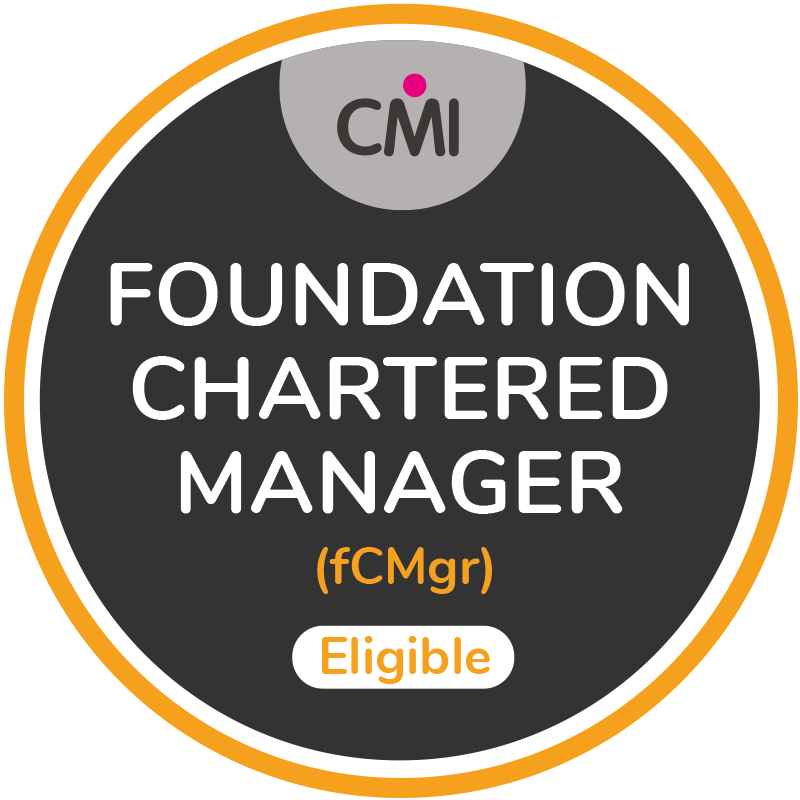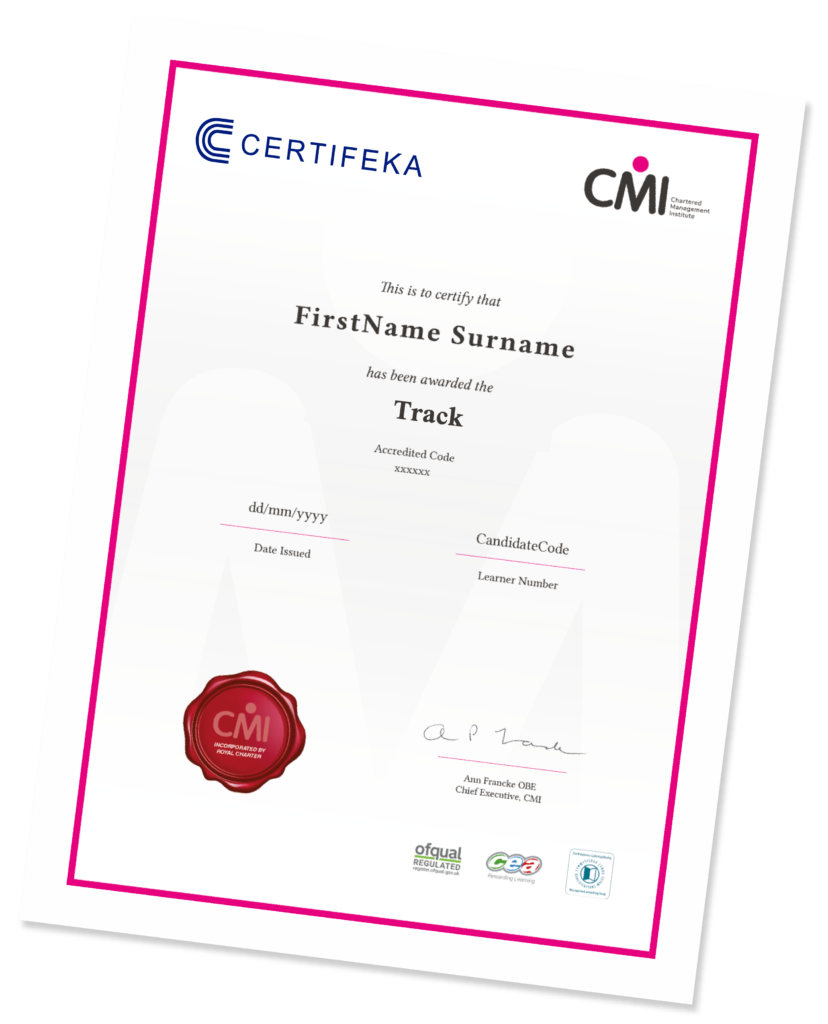Strategic Business Management (SBM) Track
September 18, 2023 2025-04-22 11:32Strategic Business Management (SBM) Track
Strategic Business Management Track
Strategic thinking for sustainable business growth.
- 30% exemption from our MBA Programs
- 3 Courses
- 180 Hours
- 56 Lessons
- CMI Track Certificate
- Certifeka Certificate
- 6 Months Access

Track Overview
The Strategic Business Management (SBM) Track centers on the integration of strategic thinking with business operations. It delves into decision-making, long-term planning, and optimizing organizational performance. By analyzing market trends, internal strengths, and external challenges, this approach prepares businesses for sustainable growth. In essence, SBM provides a holistic view of management that aligns all facets of a business towards its overarching objectives.
Track Consists of 3 CMI Courses
Find the details below
1: Strategic Planning
Strategic planning is a methodical approach used by organizations to set long-term goals and action plans, grounded in their mission and vision. It evaluates the organization's present situation, external opportunities and threats, and internal strengths and weaknesses to devise strategies for desired results. This ensures optimal resource allocation and a cohesive organizational direction. The plan might require periodic revisions due to changing conditions or priorities.
In this course, you will be introduced to:
- Strategic Thinking
- Project Management
- Proactive Attitude
- Sustainable Business Practices
- Risk Measurement/Prevention
- Enterprise Structuring
You can find the curriculum below:
Foundations of Strategic Marketing Management
Strategic Marketing Management combines market dynamics, consumer preferences, and company strengths to address market needs. It sets the course for a business, guiding its market approach and value proposition. The marketing strategy, aligned with the organization’s broader goals and mission, provides a plan for the target audience, allocating resources, and monitoring results for maximum effectiveness.
Lessons
- Mission & Vision
- Objectives & Goals
- Strategies & Tactics
- Strategic Planning
- Core Organizational Value
- Cultural Diversity
- Profit Market Share
Strategic Analysis Methodology
Strategic Analysis Methodology enables organizations to comprehend external factors by examining the larger environment, stakeholders’ needs, and data types while tracking competitor trends. It also considers changes in political, legal, and economic domains. Tools like SWOT analysis and Porter’s Five Forces, provide insights into an organization’s internal operations and market standing, facilitating well-informed strategic decisions.
- Phases of strategic management
- Macro Environmental Scanning
- Micro Environmental Scanning
- Tools of Analysis
Organizational Strategy
Organizational strategy outlines a business’s plan to reach its long-term objectives. It requires regular reviews and uses various frameworks, including the Ansoff Matrix and Porter’s Generic Strategies, for direction. The strategy is refined through tools like portfolio evaluation and is encapsulated in a routinely assessed business plan. Continuous communication with stakeholders is vital to ensure everyone understands and aligns with the company’s strategic direction.
- Levels of Strategy
- Strategic Plans
- Corporate Strategies
- Strategic Plan Audit
- The Business Plan
- Stake Holders
2: Corporate Communication Strategy
Corporate Communication Strategy is a structured approach that organizations use to convey information to internal and external stakeholders effectively. It outlines the methods and channels for disseminating key messages, aligning communication with the organization's objectives, and managing its reputation. This strategy encompasses public relations, marketing, internal communication, and crisis management, all aimed at building trust, enhancing the company's image, and achieving strategic goals. It ensures consistency in messaging and fosters engagement with various stakeholders for long-term success.
In this course, you will be introduced to:
Avoiding Miscommunication
Enhancing Services
Fostering Transparency
Building Brand Awareness
Boosting Employee Engagement
Attracting Top Talent
You can find the curriculum below:
Fundamentals of Corporate Communication Strategy
- Importance of Corporate Communication
- Purpose of Communication
- Communication flow
- Different Forms of Communication
- Constituents of corporate communication
- What are the Main Channels for Corporate Communications?
- Corporate Communication Vs Organizational Communication
- Corporate Communication Vs Marketing Communication
- Corporate social responsibility
- Crisis Communication
Corporate Communication Elements
Corporate Communication Elements include understanding its role in creating corporate identity and managing reputation and brand. It involves knowledge of PR’s role, comprehension of communication strategy concepts and evolution, and awareness of the skills and academic requirements needed for a CCS manager.
- Building a Corporate Reputation
- Corporate Identity
- Corporate image and image factors
- Corporate Communication of brand management
- Media evaluation and campaign evaluation
- Public opinion research and media tracking
- Corporate Communication Vs Public Relations
- How to become a Corporate Communication manager? Strategies
Building Corporate Communications Plan
Building a Corporate Communications Plan involves using various communication tools, creating internal and external strategic communication plans, and assessing communication channels. It also includes conducting internal and external audits to evaluate communication effectiveness for the organization.
- Characteristics of Corporate Communication
- Corporate Communications Tools and channels
- Overcoming Barriers to Communication
- Identify your key metrics for Corporate Communications Plan
- What is a Corporate Communications strategies
- How to write Corporate Communication goals
- Developing internal Corporate Communications plan
- Developing external Corporate Communications plan
3: Personal Development & Leadership
Personal Development involves self-improvement through enhancing skills, knowledge, and self-awareness. Leadership is the capacity to inspire and guide others, combining interpersonal skills, strategic vision, and trust-building.
In this course, you will be introduced to:
- Vision and Mission Mastery
- Strategic Management
- Team Leadership
- Financial Acumen
- Organizational Stability
- Time and Task Management
You can find the curriculum below:
Vision & strategy - The Intro
Understanding a vision statement is pivotal in setting an organization’s direction. Its importance lies in providing clarity and differentiating it from mission and goals. Whether viewed from a practical or academic lens, vision aids in the formation of mission statements, goals, values, and strategy. Successfully crafting and linking a vision to strategy becomes the cornerstone of organizational progression.
Lessons
- What is a vision, Mission, Values & Goals?
- What is planning & strategy?
- Linking the vision with the strategy
The Mindset
For a leader, the right mindset is essential in vision creation and its effective communication. Recognizing organizational strengths while navigating uncertainties ensures resilience. Mastering time management tools and techniques ensures efficiency. All these, combined with a strategic mindset, are fundamental for effectuating organizational success.
Lessons
- Describing futures with clarity
- Understanding your organization’s capabilities
- Prioritization & time management
- Strategic manager’s Effectiveness
Understanding Leadership
Leadership isn’t just a term; it’s an embodiment of influence and direction. A leader isn’t defined by the title but by their skills, competencies, and inherent strengths that motivate and guide teams towards collective goals.
Lessons
- Leadership explained
- Being a leader
- Leader’s strengths
Leader's personal contribution
A leader’s role extends beyond guidance; it involves recognizing and appraising team performance. Balancing their personality traits with professional demands is essential for sustainable leadership. Continuous personal growth, coupled with celebrating achievements, not only enhances the leader’s journey but also boosts team morale and cohesion.
Lessons
- Feedback and Performance
- Self-awareness and reflection
- Success celebration
Don’t miss the chance and Book a Session
Track Outcomes
Strategic Thinking
Project Management
Proactive Attitude
Sustainable Business Practices
Risk Measurement/ Prevention
Enterprise Structuring
Avoiding Miscommunication
Enhancing Services
Fostering Transparency
Building Brand Awareness
Boosting Employee Engagement
Attracting Top Talent
Vision and Mission Mastery
Strategic Management
Team Leadership
Financial Acumen
Organizational Stability
Time and Task Management


CMI Recognition & Accreditation
Once you finish your Track you will be eligible to use this CMI Foundation Chartered Manager badge across your credentials

CMI Employer Accreditation offers you a unique opportunity to be able to reward your teams’ with nationally-recognised qualifications, as part of your in-house training. Give your team the competitive edge and provide them with practical tools that can be applied straight into the workplace.
CMI represents the benchmark for Management and Leadership skills. Backed by our Royal Charter, we are the only professional body able to offer Chartered status for your managers and leaders. Included with accredited solutions like: 12 months membership with CMI, offering digital resources, networking, mentoring and skills support.
The Chartered Management Institute (CMI) is the only organization that can award Chartered Manager status, the highest accolade for managers and leaders. For 75 years, we have inspired modern managers to become successful, confident leaders.
With CMI as your lifelong career partner, you will always have access to support, guidance and development opportunities to help you achieve your professional goals, and achieve the ultimate management accolade, Chartered Manager status.
Defining your strengths against CMI’s Professional Standard, their Career Journey map identifies opportunities to develop your management and leadership skills, whatever stage of your career you’re at.
Each Chartered Manager boosts their business revenue by £62k every year
74% of students on CMI accredited courses acquired the skills to lead change and innovation
81% of students on CMI accredited courses recognized their ability to develop people and capabilities

Boost Your Career Today
3 Installments





